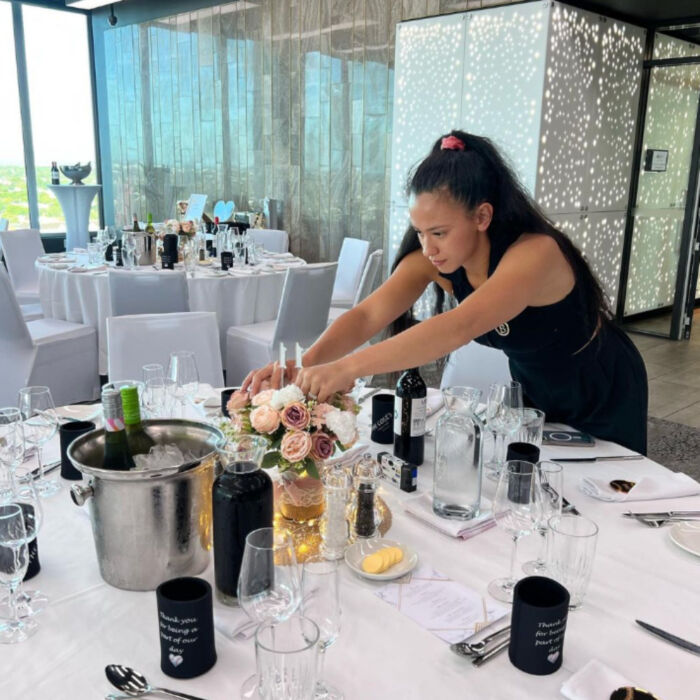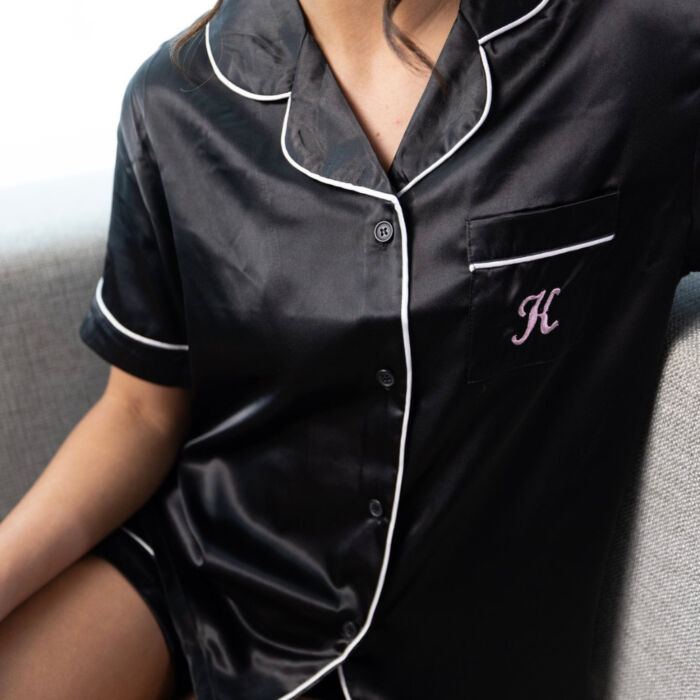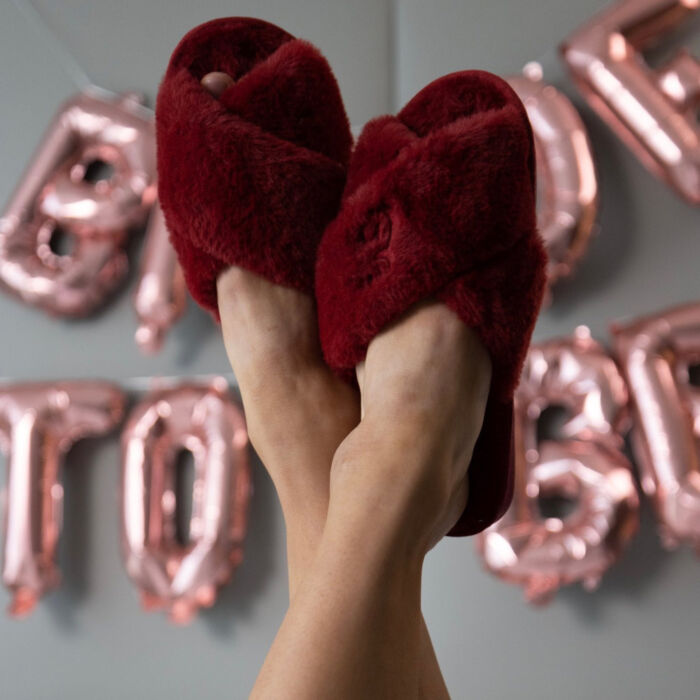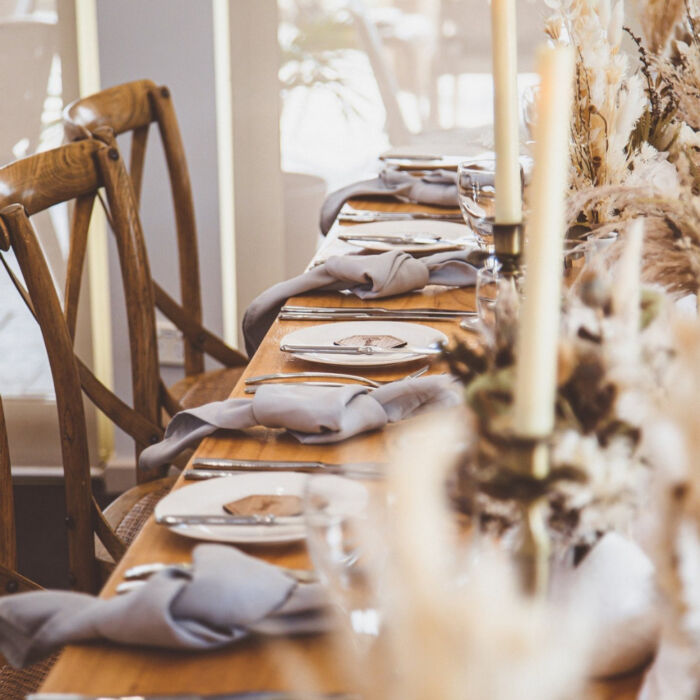The thrill. The anticipation. The calls. The website building. The samples. The price shopping. The all-hands-on-deck moments. The night before. The big day.
Does that feel like planning a wedding or starting a business?
How about both at once?
Emma Bolton began her wedding planning with a challenge. She wanted a “wow” factor. She wanted a dream. She wanted people to talk about it for days afterward. But she didn’t have unlimited funds to snap her fingers and make her memorable wedding a reality.
So Bolton started researching how to DIY everything from centerpieces to customized robes for her bridesmaids. And through watching YouTube tutorials, “pinning” nonstop on Pinterest, and spending late nights embroidering, she realized the knowledge she’d gained could help fellow brides like her.
“I just decided I’ll start a business from it because I know that it’s something I’ll continue after [the wedding], and who knows where it will take me,” Bolton says.
In 2019, Bolton’s life changed forever when she got married and started her business, Bolton Creations, an all-in-one online bridal store.
Bolton may have said “I do” to her new business, but the first years of her entrepreneurial relationship were rocky.
Answering the Question
Bolton’s path toward entrepreneurship began with another “yes or no” decision.
She was a senior in high school with a choice of two career pathways. One option was studying at university to become a business lawyer. The other was to become a professional dancer.
But when she imagined her life at school, stuck in offices for eight to 10 hours without control over her day-to-day, her decision was easy.
“I hate the idea of having to sit in an office and wait for my holidays to come around because I was very fortunate that growing up, my dad had his own business,” Bolton says.
While dancing, she had an opportunity to do marketing consulting part-time. The career path didn’t work out, but it gave her a glimpse into the freedom of entrepreneurship. Bolton says.
“It gave me that bug of entrepreneurship. And I just absolutely fell in love with the idea of being my own boss.”
But independence didn’t arrive immediately. At one point, she worked eight part-time jobs simultaneously to support her dancing career and explore opportunities to build her own business.
Her dream of starting a business came closer after her boyfriend proposed. She giddily started planning the wedding and organizing everything necessary to make the special day happen.
She’d ordered a set of pajamas for the morning of the wedding from Peter Alexander, a popular Australian sleepwear designer brand. When she unboxed them, Bolton was shocked by the average quality of the material.
“I don’t know why [I ordered them]. I think it was part of that mentality. It’s like everybody else has them, so I need to have them,” Bolton says. “And I got them, and I remember being extremely disappointed.”
She believed she could create a business to provide moments of joy and relief to brides during wedding planning while delivering quality products that didn’t blow budgets.
“People are paying a bit more for a crappier product through other companies,” Bolton says. “And I was just like, ‘This is not OK.’”
She started researching bridal robes, ordering products from different manufacturers through Alibaba, and connecting the dots between brands and materials. She found multiple brands using the same manufacturer and selling the same product at different prices with only a logo differentiating them.
“I just wanted to fix what was already out there,” Bolton says. “For example, our robes have pockets, which is something that doesn’t exist. And I’m like, ‘Why does this not exist? We live in a world where women have pockets now. So why do we not have pockets on our bridal robes?’”
Eventually, she selected a manufacturer in China that could provide the caliber she was looking for with the ability to let future customers personalize their robes.
“We definitely made the right decision in finding [a manufacturer], working with them, [and] getting the details of each design perfect before we even went to mass production,” Bolton says.
After developing a stellar bridal robe, Bolton officially started Bolton Creations.
But now, she had to get hitched.
Bride Tribe
The honeymoon period of Bolton Creations ended quickly. Although she’d launched the business during her wedding planning, she couldn’t give it full attention until the craziness of her wedding season settled.
The second year showed signs of growth in comparison, but it wasn’t to the level Bolton expected for being her own boss.
“We tripled our income because it was that small in our first year. However, it just wasn’t enough,” Bolton says.
“I thought I knew how to do it all.”
The third year of business is when Bolton met her business bridesmaid, Gretta van Riel, founder of SkinnyMe Tea and The 5th, a watch company, as well as the instructor of Foundr’s Start & Scale course.
“I was like, ‘I know this. I’ve done this. I’ve been in business for three years,’” Bolton says. “And then, by the first module, I was just gobsmacked with how much I didn’t know.”
Bolton now had a checklist to audit her business, and she was able to find gaps in manufacturing, marketing, and website optimization.
“[Start and Scale] made my business and my website what it is today, and it’s why my customer journey is so seamless,” Bolton says. “I don’t know how I even made sales before.”
After going through the course, she decided to plan a business relaunch for January 2022. First, she pulled back and researched how to market her products better. She wondered what pain point kept brides up at night. What did she remember struggling with when she was planning her wedding? And how could Bolton Creations serve those needs?
“I found, especially in my industry, value wins. Giving someone the answer that they didn’t know they had a question to is the way that you make sales in this industry,” Bolton says. “It’s not even about what my products are. It’s not even about how I can help on this day for an amount of money. It’s [asking], ‘What do you need?’”
After three years, Bolton started making business decisions beyond selling quality products at affordable prices. She wanted to build a business that could meet brides’ every need during the most exciting and stressful period of their lives.
To start, Bolton pulled up files from her wedding plan and organized them into a PDF called the “Free Ultimate Wedding Checklist & Budget Calculator.”
“The one PDF that I’ve made, it has just completely changed the way that we help people, the way that we encourage them to follow what they want to do in terms of their own wedding,” Bolton says.
“So many people are so afraid to have the wedding the way they want. So I think that has been a bit of a pressure release for them, which is nice. And it builds that trust automatically because I’m not asking for anything except for their email.”
Alongside providing a free solution to her customers, Bolton discovered another missing piece that would help meet brides’ demands.
“One thing I learned when doing a lot of market research is that no one sells bundles,” Bolton says.
“Because when you’re a bride and you want a set of pajamas, you’re not buying one—you’re buying five, six, or seven, or however many that you want to create.”
So she created tiered bundles of her products: the Bestie Bundle, Trio Bundle, and Group Bundle. Bundling at different sizes allowed Bolton’s customers to tailor their experience depending on the size of the bridal party.
“And it’s made the process … visually flow for the customer [so they can] understand their exact journey,” Bolton says.
With her website and products optimized, the days were fast approaching for her relaunch in January 2022. The next obstacle was competing for the attention of brides in an industry worth $160 billion worldwide.
Breaking Through Wedding Noise
Bolton started small.
She works and lives in Perth, Australia, where she contacted local influencers. She connected with Beck Zemek on the Australian version of Married at First Sight.
Zemek’s Bolton Creations posts immediately drove 100 people to the Bolton Creations mailing list and 400 followers to its Instagram.
Bolton continued to reach out to macro- and micro-influencers, growing Bolton Creations’ reach across social media. Macroinfluencers are internet personalities with 100,000 followers or more, whereas microinfluencers have 10,000 followers or more.
When looking for influencers to partner with, Bolton suggests working with people with a personal connection with your brand over raw numbers.
“The kind of the person that we need to find is [one] who we can give our products to that is going to share authentically,” Boltons says.
“If it’s going to be shared, it needs to be authentic. They need to love my product.”
For example, one influencer Bolton worked with posted about her products and sent customers to the shopping cart on the website. Because Bolton had given the influencer a personal tracking code, she could see the number of abandoned carts on Shopify. She followed up with the influencer and encouraged her to post again.
“Because that whole stigma [that influencers are] just posting this product because they’re trying to get the sale out of it, unfortunately, is a reality today that we have to face […],” Bolton says. “Five years ago, [that] wasn’t the case at all. There needs to be that trust [with an audience]. So there need to be multiple posts that happen from that particular influencer to encourage that person to buy.”
When researching influencers, Bolton also suggests diving deep into the account’s followers and comments. Bolton found some female influencers tend to have more of a male audience than women, which wasn’t the target audience of Bolton Creations.
“Comments are the biggest giveaway in who [influencers] are attracting,” Bolton says. “It might be worth stalking the people who like photos, not just comments, because the wedding industry, in particular, is very, very quiet.”
Bolton says that compared to the health and beauty industry, where people often share advice online, reaching brides requires a different touch.
“In the wedding industry, you are always being sold to,” Bolton says. “So no one comments. The only people that comment on your stuff are other people in the wedding industry to kind of get their brand out there. So I found that extremely difficult.”
Although the brides would share high-quality imagery from their weddings in which they were wearing and using her products, it was another step to get them to review or tag Bolton Creations. To encourage her customers to share more, Bolton includes a card in each product packaging that automatically puts customers in a raffle for a full refund if they post, tag, and review the products.
“Everyone loves to keep the item but also have their money back,” Bolton says. “You need to figure out what is best for you. And for my industry, where brides want to save money at every turn they get, that was a massive driver for them.”
View this profile on Instagram
Dreams Coming True
Anticipation. Butterflies. Double-check. Triple-check. It’s time. Here we go. It’s the big day.
Bolton’s relaunch was better than she could have imagined. Because of her strategic changes, Bolton Creations earned 30 percent of its total revenue from the previous two years within the first week of the relaunch.
This positive reinforcement has proven to Bolton that she can do more.
A process that started while planning for one of the biggest days of her life became the biggest journey of her life. Bolton created a business that could offer her more than a life stuck in an office—and the freedom to fulfill a dream of being her own boss.
“I have a very big dream for my company,” she says. “It’s just a little business, but I have a dream to answer every bride’s problem, and it doesn’t exist [yet in the market], which is exciting.”
Learn More: How April Scott Started a Luxury Sleepwear Brand From Scratch
What to Look for in Influencers
- Start locally: Look for influencers in your local area and connect with them in person.
- Review suggestions: What other profiles is Instagram suggesting you follow? They may be key influencers in your industry.
- Stay on brand: Make sure the influencers you partner with reflect the same values of your brand (what they post, who they follow, and the products they use).
- Confirm follower fit: Research the followers of a prospective influencer. Just because they seem to fit your industry doesn’t mean their followers will.
- Prioritize authenticity: Do the influencers seem to care about or value the products they showcase?
- Consider engagement: High levels of engagement show the influencer has an active community, not just an account that generates “likes.”
Get the same course that helped Emma turn her dream wedding into a dream business.

























